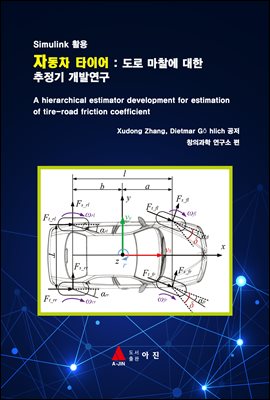
자동차 타이어 : 도로 마찰에 대한 추정기 개발연구
- 저자Xudong Zhang, Dietmar Go hlich 저
- 출판사아진
- 출판일2020-07-10
- 등록일2020-12-21
- SNS공유


- 파일포맷PDF
- 파일크기17MB
- 공급사YES24
-
지원기기
PC
PHONE
TABLET
프로그램 수동설치
전자책 프로그램 수동설치 안내
아이폰, 아이패드, 안드로이드폰, 태블릿,
보유 1, 대출 0,
예약 0, 누적대출 7, 누적예약 0
책소개
The effect of vehicle active safety systems is subject to the friction force arisingfrom the contact of tires and the road surface. Therefore, an adequate knowledge
of the tire-road friction coefficient is of great importance to achieve a good
performance of these control systems. This paper presents a tire-road friction
coefficient estimation method for an advanced vehicle configuration,
four-motorized-wheel electric vehicles, in which the longitudinal tire force is
easily obtained. A hierarchical structure is adopted for the proposed estimation
design. An upper estimator is developed based on unscented Kalman filter to
estimate vehicle state information, while a hybrid estimation method is applied as
the lower estimator to identify the tire-road friction coefficient using general
regression neural network (GRNN) and Bayes’ theorem. GRNN aims at detecting
road friction coefficient under small excitations, which are the most common
situations in daily driving. GRNN is able to accurately create a mapping from
input parameters to the friction coefficient, avoiding storing an entire complex tire
model. As for large excitations, the estimation algorithm is based on Bayes’
theorem and a simplified “magic formula” tire model. The integrated estimation
method is established by the combination of the above-mentioned estimators.
Finally, the simulations based on a high-fidelity CarSim vehicle model are carried
out on different road surfaces and driving maneuvers to verify the effectiveness of
the proposed estimation method.
목차
제 1편 : SIMULINK 기본편1.1 SIMULINK의 시작 1
블록의 연결 5
블록 파라미터의 설정 7
시뮬레이션 파라미터 (Configuration Parameters)의 설정 8
시뮬레이션의 수행 9
블록 파라미터의 표시 9
복수 데이터의 표시 11
2.2 동적 시뮬레이션 13
이차 미분방정식 17
선형 상태변수 모델 23
DC 모터의 시뮬레이션 24
함수 블록의 사용 29
차분방정식(difference equation)의 모델링 34
Subsystem(부시스템)의 구성 37
제 2편 : 연구논문
A hierarchical estimator development for estimation of tire-road
friction coefficient
1. Introduction 41
2. Vehicle modeling 42
3. Hierarchical estimation algorithm design 46
4. Hybrid estimator design for tire-road friction coefficient 49
5. Simulation results 53
6. Conclusion 57
7. References 60

















